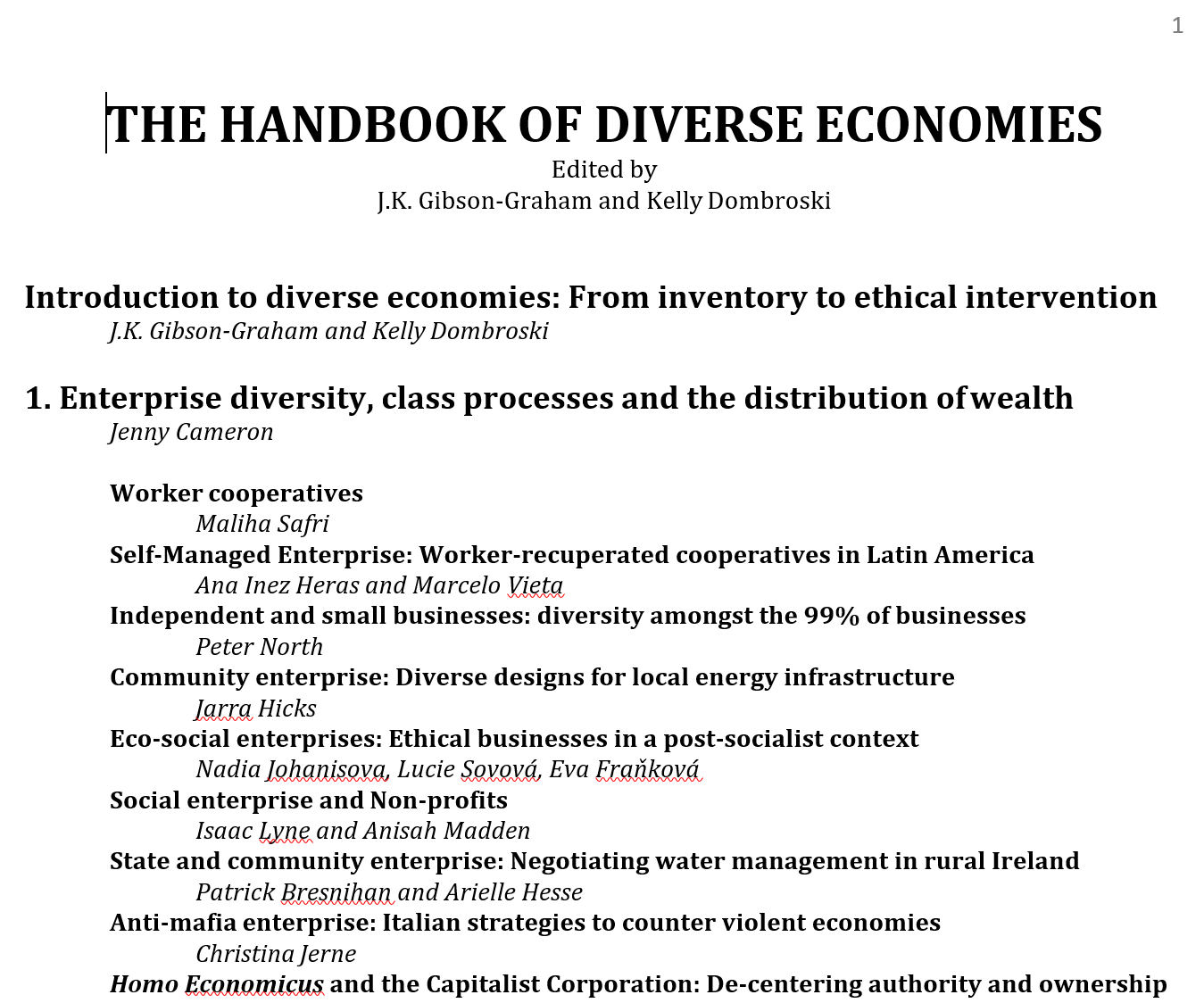I am currently working on the introduction to The Handbook of Diverse Economies with the wonderful Katherine Gibson. It is the last chapter of our 58 chapter handbook, and, as is often the case with introductions, it is flowing out of our fingers and an amazing rate! What an immense privilege it has been to participate in editing this book, and I’m so grateful for the opportunity to do so. But there are still a few things I wish I had known before I signed up — and you might find them useful too.
- The collection primarily benefits the editors, and it asks a lot of the contributors. YES, some people would love an opportunity to have their work included in an invited contribution to what will be an amazing book. But, also, people are really busy and the timeframe for an edited collection is relatively long. A lot of the work of getting the collection together is convincing people to join in, then once they have, convincing them to deliver in something like the same timeframe as everyone else. But they don’t get much benefit from it for quite some time, and they kinda have to trust that the edited book is going to be good, people will read it etc. That means they have to trust the editors to a) deliver a quality book and b) access the kind of networks needed for it to be read.
- It’s all about networking. Again. Academic life involves so much networking. This is because it’s not only your interesting work that people need to know about, but your skills to deliver on time and something quality. This means that we mostly approached people we knew to contribute, often who we had worked with before, because we knew they could deliver on topic and on target and (mostly) on time. But, as above, that goes two ways. They needed to know they could trust us too!
- Diversity is hard work. I had a vision of an incredibly diverse handbook, making sure we had entries all over the world from wonderful people of different backgrounds and experiences. But in practice, this requires a diverse network. It was much easier to get entries from people in Aotearoa New Zealand that I had a relationship with than people I vaguely knew from around the world. It also requires more intellectual work, with diverse traditions of scholarship that require genuine engagement and diverse cultures of engagement that require me to dampen down my productivity overdrive and actually slow down and listen.
- I have a new respect for details orientation. There is something so joyful about receiving a nice, clean, well-written text, with all references included in the correct format. Ahh. It’s like the first sip of a good cup of tea. Even if it requires reworking, there a certain pleasure to an aesthetic read.
- Restructuring is the norm. I’m not sure if this was because I was working with the classic moves of Gibson-Graham (take the end and bring it to the beginning!), but almost all the pieces required some restructuring. Academic editing isn’t just picking up little things you missed, but is developing the skill to pull out the argument the author is implying and help them make it pop! This actually requires quite a bit of intellectual energy and I did have to reserve time to have the mental space to do this. (Let’s just say it was morning work, not after lunch work)
- I had to work with my fear of just jumping in and working the text. It seems awful and presumptuous to do so, but sometimes you can kind of see what needs to be done to make something work, and sometimes you just gotta do it. Of course, this *always* needs to be returned to the author for checking, and I did try and use what was there as much as I could. This is why having an actual relationship with the contributing authors is helpful — you can gauge to what degree this is OK and what needs to be negotiated. In saying this, I think there are power dynamics here that need to be attended to: I was more comfortable doing this with students than colleagues or people who were my academic seniors. It also pays to be very attentive to race, gender and more here: am I perpetuating power relations in problematic ways through my editing? Who and what am I silencing? My fears were grounded in the possibilities of being a colonising douchebag — real fears, a real possibility, but still, I had to work out how to be an editor.
Well — my kids are walking in the door, it’s my last few days of sabbatical. Check out The Handbook of Diverse Economies when it comes out in 2020!!

